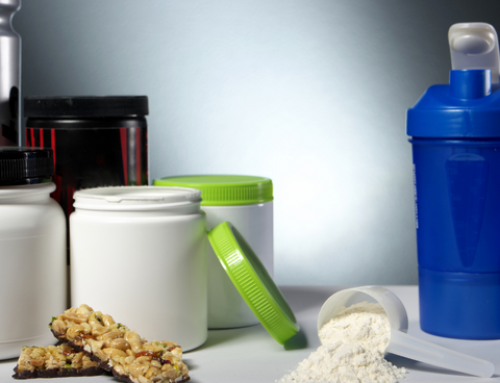Creatine Benefits for Athletes
Creatine is one of the most popular sports supplements on the market. It’s also one of the most misunderstood. Media reports often claim creatine supplementation is dangerous, saying it causes kidney damage and can be a gateway to anabolic steroids. But when used correctly, creatine has several benefits that can be helpful for athletes. Here’s what you need to know about creatine and its benefits.
RELATED: Creatine Myths Exposed
What is Creatine?
Creatine is a nitrogenous organic acid that is naturally produced in the body by the amino acids glycine and arginine. It’s also found in protein-rich foods such as meat and fish. However, you would need to eat a lot of meat and fish to obtain an appreciable amount of creatine, which is one reason why creatine is frequently ingested as a supplement; it’s hard to get enough of it to feel its benefits through food alone.
RELATED: Positive Side Effects of Creatine (Besides Building Muscle)
How Does Creatine Work?
Creatine helps to regenerate a molecule called adenosine triphosphate (ATP), which is your body’s main source of energy. When creatine stores in your muscles are depleted, the production of ATP comes to a screeching halt and your energy is dramatically decreased. Supplementing with creatine increases the available fuel to power ATP, which can increase your strength and power output.
RELATED: The Best Time to Consume Creatine
Who Can Benefit from Creatine?
Supplementing with creatine is beneficial for several types of sports, including sprinting, swimming and soccer. Creatine supplementation can also help increase your strength, power and muscle mass, which makes it useful for sports like football. It’s important to note that creatine supplementation is not effective for exercise or events lasting more than 90 seconds, like long-distance running.
RELATED: Athletic Performance Benefits of Creatine
What Kind of Creatine is Best?
Take a quick trip to your local nutrition store or search online for creatine, and you’ll quickly find there are more types than you ever imagined. And with each supplement company touting their creatine as the best, making a smart and informed decision on what kind to buy can be difficult.
When in doubt, go with the research. The most studied form of creatine is creatine monohydrate. No other form is proven safer, more effective, or as inexpensive as creatine monohydrate.
RELATED: 3 Tips on Choosing the Best Post-Workout Creatine
How to take Creatine
Creatine is supplemented one of two ways. The first way is called “loading.” This requires taking 20 grams of creatine for five to seven consecutive days. Following the loading phase, three to five grams of creatine are taken daily. This is called the maintenance phase. The idea of loading creatine is to initially saturate the muscle cells, promoting faster results.
Skipping the loading phase and simply taking three to five grams per day is the other method. It takes longer to saturate the muscles, so it will likely take longer to see results. The timing of creatine will not make or break your training goals, but taking creatine after a workout with fast-digesting carbohydrates (like a sports drink) may be your best option.
Creatine Safety
Creatine is one of the safest sports supplements available, yet many myths about it still linger.
The main concern is that creatine damages the kidneys. But zero data supports this notion. In fact, several studies show that creatine has absolutely no effect on kidney function in healthy people. One study found no changes in kidney function between collegiate football players who supplemented with creatine and those who didn’t for nearly two years. Another study showed no changes in kidney function in individuals who consumed 10 grams of creatine a day—twice the recommended daily dose—over the course of 12 weeks.
The only reported side effects of creatine supplementation are stomach cramping and diarrhea. However, they are often preventable and only tend to happen when too much creatine is taken at one time or if you don’t drink enough water.
Although creatine is considered remarkably safe, the American College of Sports Medicine recommends that athletes be at least 18 years old before starting to use creatine. This is because the majority of studies on the safety of creatine supplementation have been performed on young adults aged 18 or older.
References
- Skare OC, Skadberg, Wisnes Ar. “Creatine supplementation improves sprint performance in male sprinters.” Scand J Med Sci Sports 2001; 11:96-102.
- Preen D, Dawson B, Goodman C, et al. “Effect of creatine loading on long-term sprint exercise performance and metabolism.” Med Sci Sports Exerc. 2001; 33:814-21.
- Mero AA, Keskinen KL, Malvela MT, et al. “Combined creatine and sodium bicarbonate supplementation enhances interval swimming.” J Strength Cond Res. 2004; 18:306-310.
- Ostojic SM. “Creatine supplementation in young soccer players.” Int J Sport Nutr Exerc Metab. 2004; 14:95-103.
- Rawson ES, Volek JS. “Effects of creatine supplementation and resistance training on muscle strength and weightlifting performance.” J Strength Cond Res. 2003; 17(4):822-31.
- Astorino TA., Marrocco AC., Gross SM., et al. “Is running performance enhanced with creatine serum ingestion?” J Strength Cond Res. 2005; 19(4):730-4.
- Jager R, Purpura M, Shae A, et al. “Analysis of the efficacy, safety, and regulatory status of novel forms of creatine.” Amino Acids. 2011; 40(5):1369-83
- Jaqim AR, Oliver JM, Sanchez A, et al. “A buffered form of creatine does not promote greater changes in muscle creatine content, body composition, or training adaptations than creatine monohydrate.” J Int Soc Sports Nutr. 2012; 9(1):43.
- Buford TW., Kreider, RB., Stout JR., et al. “International Society of Sports Nutrition position stand: creatine supplementation and exercise.” J Int Soc Sports Nutr. 2007; 30:4.
- Gualano B., Ugrinowitsch C, Novaes RB, et al. “Effects of creatine supplementation on renal function: a randomized, double-blind, placebo-controlled clinical trial.” Eur J Appl Physiol. 2008; 103(1):33-40.
- Kreider RB, Melton C, Rasmussen CJ., et al. “Long-term creatine supplementation does not significantly affect clinical markers of health in athletes.” Mol Cell Biochem. 2003; 244(1-2):95-104.
- Lugaresi R., Leme M., Vitor de Salles P., et al. “Does long-term creatine supplementation impair kidney function in resistance-trained individuals consuming a high-protein diet?” J Int Soc Sports Nutr. 2013; 10:26.
RECOMMENDED FOR YOU
MOST POPULAR
Creatine Benefits for Athletes
Creatine is one of the most popular sports supplements on the market. It’s also one of the most misunderstood. Media reports often claim creatine supplementation is dangerous, saying it causes kidney damage and can be a gateway to anabolic steroids. But when used correctly, creatine has several benefits that can be helpful for athletes. Here’s what you need to know about creatine and its benefits.
RELATED: Creatine Myths Exposed
What is Creatine?
Creatine is a nitrogenous organic acid that is naturally produced in the body by the amino acids glycine and arginine. It’s also found in protein-rich foods such as meat and fish. However, you would need to eat a lot of meat and fish to obtain an appreciable amount of creatine, which is one reason why creatine is frequently ingested as a supplement; it’s hard to get enough of it to feel its benefits through food alone.
RELATED: Positive Side Effects of Creatine (Besides Building Muscle)
How Does Creatine Work?
Creatine helps to regenerate a molecule called adenosine triphosphate (ATP), which is your body’s main source of energy. When creatine stores in your muscles are depleted, the production of ATP comes to a screeching halt and your energy is dramatically decreased. Supplementing with creatine increases the available fuel to power ATP, which can increase your strength and power output.
RELATED: The Best Time to Consume Creatine
Who Can Benefit from Creatine?
Supplementing with creatine is beneficial for several types of sports, including sprinting, swimming and soccer. Creatine supplementation can also help increase your strength, power and muscle mass, which makes it useful for sports like football. It’s important to note that creatine supplementation is not effective for exercise or events lasting more than 90 seconds, like long-distance running.
RELATED: Athletic Performance Benefits of Creatine
What Kind of Creatine is Best?
Take a quick trip to your local nutrition store or search online for creatine, and you’ll quickly find there are more types than you ever imagined. And with each supplement company touting their creatine as the best, making a smart and informed decision on what kind to buy can be difficult.
When in doubt, go with the research. The most studied form of creatine is creatine monohydrate. No other form is proven safer, more effective, or as inexpensive as creatine monohydrate.
RELATED: 3 Tips on Choosing the Best Post-Workout Creatine
How to take Creatine
Creatine is supplemented one of two ways. The first way is called “loading.” This requires taking 20 grams of creatine for five to seven consecutive days. Following the loading phase, three to five grams of creatine are taken daily. This is called the maintenance phase. The idea of loading creatine is to initially saturate the muscle cells, promoting faster results.
Skipping the loading phase and simply taking three to five grams per day is the other method. It takes longer to saturate the muscles, so it will likely take longer to see results. The timing of creatine will not make or break your training goals, but taking creatine after a workout with fast-digesting carbohydrates (like a sports drink) may be your best option.
Creatine Safety
Creatine is one of the safest sports supplements available, yet many myths about it still linger.
The main concern is that creatine damages the kidneys. But zero data supports this notion. In fact, several studies show that creatine has absolutely no effect on kidney function in healthy people. One study found no changes in kidney function between collegiate football players who supplemented with creatine and those who didn’t for nearly two years. Another study showed no changes in kidney function in individuals who consumed 10 grams of creatine a day—twice the recommended daily dose—over the course of 12 weeks.
The only reported side effects of creatine supplementation are stomach cramping and diarrhea. However, they are often preventable and only tend to happen when too much creatine is taken at one time or if you don’t drink enough water.
Although creatine is considered remarkably safe, the American College of Sports Medicine recommends that athletes be at least 18 years old before starting to use creatine. This is because the majority of studies on the safety of creatine supplementation have been performed on young adults aged 18 or older.
References
- Skare OC, Skadberg, Wisnes Ar. “Creatine supplementation improves sprint performance in male sprinters.” Scand J Med Sci Sports 2001; 11:96-102.
- Preen D, Dawson B, Goodman C, et al. “Effect of creatine loading on long-term sprint exercise performance and metabolism.” Med Sci Sports Exerc. 2001; 33:814-21.
- Mero AA, Keskinen KL, Malvela MT, et al. “Combined creatine and sodium bicarbonate supplementation enhances interval swimming.” J Strength Cond Res. 2004; 18:306-310.
- Ostojic SM. “Creatine supplementation in young soccer players.” Int J Sport Nutr Exerc Metab. 2004; 14:95-103.
- Rawson ES, Volek JS. “Effects of creatine supplementation and resistance training on muscle strength and weightlifting performance.” J Strength Cond Res. 2003; 17(4):822-31.
- Astorino TA., Marrocco AC., Gross SM., et al. “Is running performance enhanced with creatine serum ingestion?” J Strength Cond Res. 2005; 19(4):730-4.
- Jager R, Purpura M, Shae A, et al. “Analysis of the efficacy, safety, and regulatory status of novel forms of creatine.” Amino Acids. 2011; 40(5):1369-83
- Jaqim AR, Oliver JM, Sanchez A, et al. “A buffered form of creatine does not promote greater changes in muscle creatine content, body composition, or training adaptations than creatine monohydrate.” J Int Soc Sports Nutr. 2012; 9(1):43.
- Buford TW., Kreider, RB., Stout JR., et al. “International Society of Sports Nutrition position stand: creatine supplementation and exercise.” J Int Soc Sports Nutr. 2007; 30:4.
- Gualano B., Ugrinowitsch C, Novaes RB, et al. “Effects of creatine supplementation on renal function: a randomized, double-blind, placebo-controlled clinical trial.” Eur J Appl Physiol. 2008; 103(1):33-40.
- Kreider RB, Melton C, Rasmussen CJ., et al. “Long-term creatine supplementation does not significantly affect clinical markers of health in athletes.” Mol Cell Biochem. 2003; 244(1-2):95-104.
- Lugaresi R., Leme M., Vitor de Salles P., et al. “Does long-term creatine supplementation impair kidney function in resistance-trained individuals consuming a high-protein diet?” J Int Soc Sports Nutr. 2013; 10:26.










